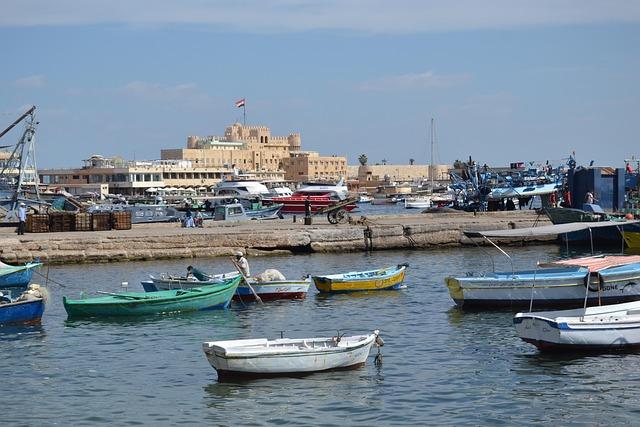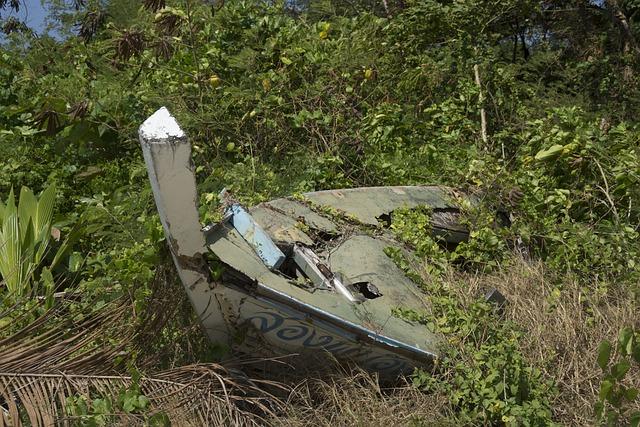Egypt’s Alexandria Achieves Landmark Recognition as UNESCO-IOC Tsunami Ready Community
In a historic milestone for both Egypt and Africa, the city of Alexandria has been officially designated as the continent’s first Tsunami Ready community by the Intergovernmental Oceanographic Commission (IOC) of UNESCO. This important achievement not only underscores Alexandria’s commitment to enhancing its disaster preparedness and response strategies but also highlights its proactive approach to safeguarding its residents against potential seismic threats. As one of the world’s oldest cities, steeped in rich maritime history, Alexandria’s recognition as a UNESCO-IOC Tsunami ready community exemplifies a broader initiative aimed at bolstering coastal resilience and fostering greater awareness of tsunami risks in vulnerable regions. This article delves into the implications of this prestigious designation, the rigorous criteria that Alexandria met, and the vital role such recognition plays in enhancing the safety and well-being of coastal communities across Africa.
Alexandria’s Journey to Tsunami Readiness and UNESCO Recognition
In a historic achievement for both Egypt and the African continent, Alexandria has emerged as the first community to receive the esteemed UNESCO-IOC Tsunami Ready designation. This recognition underscores the city’s robust preparedness framework aimed at mitigating the risks associated with tsunamis, particularly considering its coastal geography. The initiative has involved collaborative efforts among various stakeholders, ensuring that essential infrastructures are in place and that residents are well-informed about evacuation procedures. Key strategies implemented include:
- Community Awareness Programs: Engaging local citizens with educational workshops and simulations.
- Effective Communication Systems: Establishing early warning alerts and swift notification pathways.
- Emergency Response Planning: Crafting and rehearsing clear evacuation routes and safety protocols.
The effort not only elevates Alexandria’s status on a global platform but also sets a precedent for other coastal cities at risk from natural disasters. Aligning local efforts with UNESCO’s guidelines, Alexandria exemplifies how integrating scientific research with community engagement can foster resilience against potential tsunami threats. This milestone was celebrated with a series of events, which included:
| Event | Date | Description |
|---|---|---|
| Launch of Awareness Campaign | March 15, 2023 | Kickoff of local educational initiatives. |
| Simulated Evacuation Drill | april 10, 2023 | Practical exercise for residents and authorities. |
| Recognition Ceremony | May 5, 2023 | Award presentation led by UNESCO officials. |

Understanding the Significance of UNESCO-IOC Tsunami Ready Designation
The UNESCO-IOC Tsunami Ready designation is a prestigious acknowledgment that signifies a community’s commitment to tsunami management and preparedness. By achieving this status, Alexandria stands as a beacon of resilience in the face of natural disasters, showcasing its readiness to protect lives and property.This designation involves a rigorous evaluation process that assesses the community’s level of preparedness through various essential elements, including:
- Community education: Engaging residents in tsunami awareness programs and drills.
- Warning Systems: Implementing effective early warning systems to disseminate alerts promptly.
- Evacuation Plans: Developing and updating comprehensive evacuation routes and plans.
- Community engagement: Encouraging active participation from local stakeholders and institutions.
As Alexandria sets a benchmark for other communities in Egypt and Africa, it reinforces the importance of collective action and preparedness in the face of potential tsunamis. The Tsunami Ready program not only empowers local authorities but also highlights the significance of community involvement in disaster risk reduction. The benefits of this prestigious designation are profound,as it fosters a culture of safety and vigilance that can ultimately save lives. key aspects of the designation include:
| Key Aspects | Significance |
|---|---|
| Awareness Campaigns | Informed citizens are better prepared to respond effectively. |
| Risk Assessment | Identifying vulnerable areas mitigates potential impacts. |
| International Cooperation | Enhances partnerships for shared knowledge and resources. |
| Sustainable Development | Integrates disaster preparedness into community planning. |

Key Features of Alexandria’s Tsunami Preparedness Initiatives
Alexandria’s recognition as a UNESCO-IOC Tsunami Ready Community highlights its comprehensive and proactive approach to natural disaster preparedness.The city has implemented a series of key initiatives aimed at enhancing public awareness and building resilience against tsunamis. Among these initiatives are:
- education and Training: Regular workshops and simulations for residents to understand tsunami risks and response techniques.
- Community Engagement: Participation of local organizations and schools in tsunami drills and safety protocols.
- Information Dissemination: Establishment of alert systems and distribution of educational materials through various channels.
Moreover, alexandria has prioritized the development of vital infrastructure to support its tsunami readiness. Efforts include the enhancement of early warning systems, which play a crucial role in ensuring prompt alerts to residents. Additionally,the city has undertaken initiatives to create safe zones,allowing residents to reach higher ground quickly during emergencies.The table below highlights these infrastructural advancements:
| Infrastructure Initiative | Description |
|---|---|
| Early Warning Systems | Integration of technology for timely alerts. |
| Community Safe Zones | Designated elevated areas for evacuation. |
| Evacuation Routes | Clearly marked paths to guide residents to safety. |

Lessons from Alexandria: Insights for Other Coastal Communities
The triumphant journey of Alexandria as egypt and AfricaŌĆÖs inaugural UNESCO-IOC Tsunami Ready Community holds invaluable lessons for other coastal regions. Community engagement emerged as a cornerstone of Alexandria’s approach, highlighting the essential role local populations play in disaster preparedness. Coastal communities can foster this engagement by:
- Conducting regular awareness campaigns to educate citizens about tsunami risks and protocols.
- Establishing early warning systems that allow residents to stay informed and take necessary actions swiftly.
- Involving local stakeholders in the planning and implementation of safety measures to ensure they meet the unique needs of the community.
moreover, Alexandria exemplifies the importance of solid collaboration among agencies. By forming partnerships with governmental bodies, NGOs, and international organizations, the city elevated its preparedness strategy. Other coastal areas can adopt a similar model by:
- Creating multi-sector task forces that bring together diverse expertise to address tsunami readiness.
- Sharing best practices through regional networks to enhance collective knowledge and resilience.
- Investing in training and capacity-building for local responders and volunteers to ensure a prompt and efficient response during emergencies.

Recommendations for Sustaining and Enhancing Tsunami preparedness in Alexandria
To maintain and enhance tsunami preparedness in Alexandria, it is indeed vital to engage the community through continuous education and awareness programs.These initiatives should focus on the importance of understanding tsunami risks, evacuation routes, and emergency response protocols. Implementing regular drills can substantially improve community readiness, ensuring that residents are familiar with the actions to take in the event of a tsunami. Collaboration with local schools and community organizations can foster a culture of preparedness from a young age, promoting the message of safety throughout the city.
Furthermore, leveraging technology will play a critical role in sustaining the momentum of tsunami preparedness. Establishing a dedicated communication system that provides timely alerts and updates can enhance the community’s response capabilities. Local authorities should consider deploying mobile applications or text alert systems, which can deliver real-time information to residents. Additionally, creating partnerships with scientific organizations for ongoing research and data analysis will ensure that Alexandria’s tsunami preparedness strategies are informed by the latest findings. Below is a simple table summarizing key action points:
| Action Point | Description |
|---|---|
| Community Education | Regular workshops and seminars about tsunami risks and safety protocols. |
| Emergency Drills | Conducting periodic tsunami evacuation drills for residents. |
| Technology Utilization | Establishing a communication system for real-time alerts and updates. |
| Partnerships | Collaboration with scientific organizations for research and data sharing. |

Future Challenges and Opportunities for Continued Disaster Resilience in Egypt and Africa
The recognition of Alexandria as the first UNESCO-IOC Tsunami Ready Community in Egypt and Africa sets a vital precedent for disaster preparedness in the region. This milestone not only demonstrates the city’s commitment to enhancing community resilience but also serves as a model for other coastal areas confronting similar natural hazards. For the future, Egypt must prioritize capacity building and public awareness initiatives, fostering a culture of safety that empowers citizens to react effectively during emergencies. Key areas of focus may include:
- Training programs for emergency responders
- Regular community drills and simulations
- Integration of local knowledge and culture into preparedness strategies
Furthermore,as climate change amplifies the frequency and intensity of natural disasters,African nations face both challenges and opportunities in disaster resilience. Collaborative regional efforts are essential to sharing knowledge, resources, and best practices among nations. By leveraging technology and innovation in disaster risk management, Egypt and other African countries can enhance their preparedness. Consideration should also be given to establishing regional partnerships and networks that facilitate:
| Area of Focus | Potential Benefits |
|---|---|
| Knowledge Sharing | Improved strategies tailored to local conditions |
| Resource Mobilization | Efficient allocation of financial and logistical support |
| Community Engagement | Stronger local initiatives and heightened awareness |
to sum up
Alexandria’s designation as the first UNESCO-IOC Tsunami Ready Community in Egypt and Africa marks a significant milestone not only for the city but also for the broader region’s resilience against natural disasters.This recognition underscores the effectiveness of local initiatives in disaster preparedness and community engagement, reflecting a proactive approach to ensuring safety and sustainability in the face of potential environmental threats. As Alexandria sets a benchmark for others to follow, it serves as a powerful reminder of the importance of preparedness, education, and collaboration in safeguarding communities against the unpredictable forces of nature. The implications of this designation extend beyond geographical boundaries, inspiring other coastal communities across the continent to adopt similar measures, thereby fostering a culture of resilience that is essential in todayŌĆÖs rapidly changing climate.







